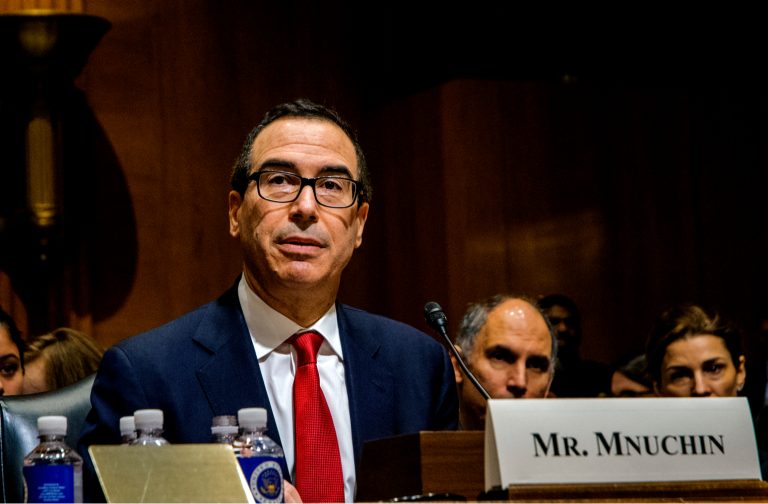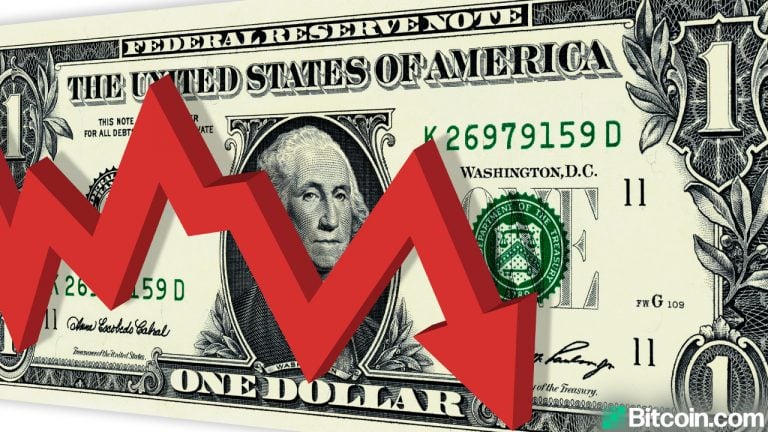
2019-7-17 11:46 |
On July 16, U.S. Department of the Treasury Secretary Steven Mnuchin gave a short press briefing discussing cryptocurrencies and the pressing need for regulation. A 28-minute slodge of alphabet agency soup, studded with calculated mentions of “terrorism” nearly every minute, casual observers were left confused. Are we talking about crypto or biological weapons of mass destruction here? Make no mistake, these misguided attacks on Bitcoin will continue as long as a threat is posed to obsolete and violent government economic systems. How they will attack is predictable: using some of the world’s most heinous, emotionally evocative crimes.
Like Dogs HowlingThere’s a funny thing about dogs. When one howls, they all do, even if none of them really knows why. It’s the same with state-sponsored media. The AP releases something, and the top dogs in the news (i.e. those with the most funding and deepest state connections) start howling. Bitcoin is being used for terrorism! Libra will throw the U.S. into financial chaos! Soon, the smaller outlets — the media puppies, let’s call them — jump into the action. Not long after, there is a curious chorus of shrieking howls echoing across the culture, and those not even necessarily agreeing start to buy the story, if almost subconsciously.
Uncle Dave, who knows nothing about Bitcoin, will assure you in no uncertain terms at the family barbecue. This Bitcoin stuff is not good for America. Aunt Linda will chime in: “Yes, it’s used for terrorism!” Good luck reasoning with them. After all, howling is a very emotional thing. It’s a visceral expression of existential fear and sadness. Anyone who shouts against the cacophony is likely to be viewed as a threat. Or even an accomplice. It’s an exercise in primitive tribalism, really. A kind of bandwagon propaganda in and of itself.
Child Pornography, Drug Trafficking, and TerrorWith the Jeffrey Epstein case fresh in the media, the child pornography angle of attack will become especially pointed from now on. After all, it’s been used before, repeatedly. According to former president Barack Obama, cryptographic technology raises urgent questions:
Then how do we apprehend the child pornographer? How do we solve or disrupt a terrorist plot? What mechanisms do we have available to do even simple things like tax enforcement?
It’s ironic that the Obama administration effectively shut down an ICE investigation called Project Flicker which unearthed a festering and systemic plague of child porn in Washington, including 264 DoD officials, and high-level Pentagon officials with top security clearances. Only a few cases were investigated before the matter was swept under the rug.
Excerpt from the Project Flicker report archive, in which 264 DoD officials were identified as having subscribed to child porn websites using government email addresses.With 1,700 cases not investigated, and at least one official fleeing after indictment, it looks like the state is actually where illicit secrecy reigns supreme. This is not to mention the 16 NASA employees busted buying pornographic pictures of children as young as three, with personal credit cards and Paypal accounts. Their names of course can’t be released due to “government guidelines.” They could still be working for NASA for all anyone knows. Just last week, in fact, on July 8, a former NASA associate and professor at Portland State University pleaded no contest to “encouraging child sex abuse.”
According to prosecutors:
A forensic evaluation of Lehman’s cell phone revealed hundreds of child pornography of female victims between the ages of three and 12 being raped and sexually abused
If something this heinous at the very top levels of government is ignored by the ilk of Obama, Trump, Mnuchin and their cronies, how far down does the rabbit hole actually go?
Of course, child pornography is not the only issue state-sanctioned propaganda leverages against crypto, though it is arguably the most emotionally charged. Drug trafficking and “terrorism” (Mnuchin’s new favorite word) are the two other legs of this shoddily fabricated table to support the state’s “case” against Bitcoin.
Who’s Got the Most Dirty Laundry? Source: https://messari.io/c/research/bitcoin-in-the-grand-scheme-of-thingsAccording to the United Nations office of Drugs and Crime (UNODC), most launderers are still using the almighty USD and the government regulated banking system to facilitate their activity. In fact, there’s really no contest. The stats find that for each dollar spent in BTC on the darknet, a staggering $800 in USD is criminally laundered.
With JP Morgan now embroiled in their cocaine ship scandal — discovered moving over $1.3B in illicit drugs — the recent ramped-up media assault on Bitcoin and Libra is telling. The centralized “drugbanks” of the world continuously evade any real prosecution or scrutiny, while lower level offenders are made glaring examples of.
The largest bank in Europe, HSBC, paid out a hefty $1.9B in 2012 to the U.S. Justice Department, avoiding prosecution for assisting Mexican and Colombian drug cartels in laundering $800M in narcotics loot. They were allowed to do so because, according to state officials, the bank’s work is important for the stability of society. Kristi Jacobsen, who directed a related episode of Netflix’s series “Dirty Money” called “Cartel Banks” had this to say:
That experience reflected what I think is the American way — to overpunish in terms of sentences for poor people, people of color, people who are powerless. HSBC was underpunished. A kid busted for marijuana possession can’t get away with saying, ‘I haven’t done a good job and I’ll change my behavior,’ as HSBC was allowed to.
Financing Terror Is the Name of the GameMoney laundering such as that engaged in by HSBC opens channels for massive funding of terrorists and terror cells globally. Many of the alphabet agencies mentioned in Treasury Secretary Mnuchin’s address have been complicit in covert funding of known terrorist groups. However, some of this funding and support is also done right out in the open.
In 2017, the United States and Saudi Arabian governments entered into a massive and controversial arms deal. The agreement provided an immediate $110B and $350B over 10 years, to a state that routinely beheads individuals for torture-induced “confessions,” homosexuality, and drug offenses. To many baffled critics, this didn’t seem like something a government concerned with human rights should do. Even now, Saudi forces are directly creating a mass starvation epidemic in Yemen by continuing to drop bombs on the decimated nation.
It has everything to do with global military dominance and resources. Nothing to do with the safety and security of human beings. As Trump told NBC News’ Chuck Todd on June 23:
I’m not like a fool that says, ‘We don’t want to do business with them.’ And by the way, if they don’t do business with us, you know what they do? They’ll do business with the Russians or with the Chinese. They will buy – we make the best equipment in the world, but they will buy great equipment from Russia and from China
One wonders why so much rhetoric is being devoted to talk of crypto regulation. After all, the Saudi government is committing all kinds of human rights abuses, yet the business negotiations take precedent. Idioms about pots and kettles come to mind. Maybe it’s the technological innovation they hate.
“So how come my local mall does more business in an afternoon than the entire Internet handles in a month? Even if there were a trustworthy way to send money over the Internet — which there isn’t — the network is missing a most essential ingredient of capitalism: salespeople.”
-Clifford Stoll, Newsweek, 1995
Like all new technological innovations, Bitcoin has come under attack from a rabid and motley crew of luddites, wide-mouthed politicos, and fearful authoritarians resting on the old laurels of a now rotted status quo. While some have legitimate concerns about crypto’s potential uses, monetary surveillance, and a perceived lack of stability, most are simply howling along with the mass media pack, not really knowing why. Surely everyone remembers Noble Prize-winning economist Paul Krugman sounding off in 1998:
The growth of the Internet will slow drastically, as the flaw in ‘Metcalfe’s law’ becomes apparent: most people have nothing to say to each other! By 2005, it will become clear that the Internet’s impact on the economy has been no greater than the fax machine’s
This guy won a Nobel Prize in economics. This says something about appeals to authority and tradition. Even television was met with scandalized resistance, during its advent. It’s no surprise then that bitcoin has been declared “dead” hundreds of times since its creation. Notably so by the renowned Washington Post in 2016. “R.I.P., Bitcoin,” indeed.
Ron Paul Slays Interview, Bitcoin Lives OnWith all the mealy-mouthed clatter from Trump and Mnuchin’s MSM, former Texas Congressman Ron Paul’s recent CNBC interview is a breath of fresh air. When pressured to give some sort of justification for centralized state regulation, Paul remarked:
What the problem is, is you never have a truly free market. There’s always something the government says or does, or introduces a regulation. But they did that with gold, too…so they’ll do that with crypto as well. But no. If the market is allowed to operate, the bad guys get weeded out.
Paul went on to encourage multi-currency “true competition” with the U.S. dollar, something that is currently illegal. His view that a truly free market would weed out competition efficiently is supported economically, as market signals reducing demand for bad actors and faulty products or services are not stifled by centralized manipulation.
In a pill of truly bitter irony though, subjects to the U.S. dollar worldwide now must pay with their labor, their wealth, and even their lives and the lives of their families, to protect a child porn-proliferating, blood-bathed-terrorist financing, criminal drug syndicate the likes of which the world has never seen. All to the braindead mass media howls of “freedom,” of course.
What are your thoughts? Let us know in the comments section below.
OP-ed disclaimer: This is an Op-ed article. The opinions expressed in this article are the author’s own. Bitcoin.com is not responsible for or liable for any content, accuracy or quality within the Op-ed article. Readers should do their own due diligence before taking any actions related to the content. Bitcoin.com is not responsible, directly or indirectly, for any damage or loss caused or alleged to be caused by or in connection with the use of or reliance on any information in this Op-ed article.
Images courtesy of Shutterstock, Fair Use
Did you know you can verify any unconfirmed Bitcoin transaction with our Bitcoin Block Explorer tool? Simply complete a Bitcoin address search to view it on the blockchain. Plus, visit our Bitcoin Charts to see what’s happening in the industry.
The post How They Will Attack Bitcoin: The Hypocritical Shock Campaign of US Monetary Policy appeared first on Bitcoin News.
origin »Bitcoin price in Telegram @btc_price_every_hour
Bitcoin (BTC) íà Currencies.ru
|
|























